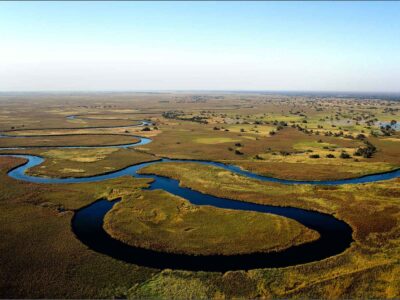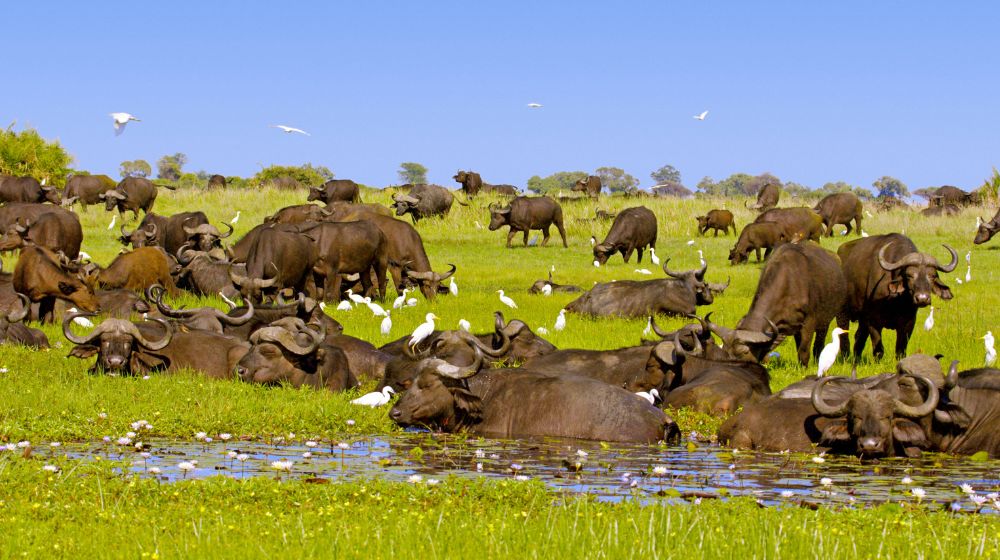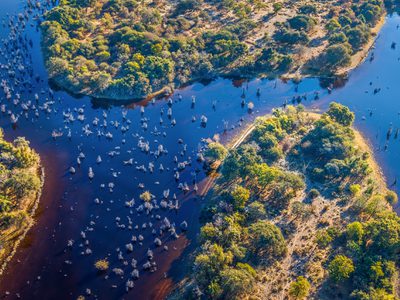Exploring the Magic of the Okavango Delta: A Complete Travel Guide

Overview of the Okavango Delta
Introduction to the Okavango Delta
The Okavango Delta, often referred to as one of the world's greatest natural wonders, is a sprawling wetland in Botswana that offers a unique mosaic of diverse ecosystems. This UNESCO World Heritage Site is not only a haven for wildlife but also a prestigious destination for nature enthusiasts seeking an immersive experience in the African wilderness. Known for its striking landscapes made up of lush vegetation, intricate waterways, and expansive floodplains, the Delta is a remarkable example of a river delta that does not drain into an ocean, but instead infiltrates the Kalahari Desert. For trip planning and ready-made itineraries that focus on the Delta, consider Encounters’ Botswana & Okavango Delta tours, a strong, fuss-free starting point.
Location and Geographic Features
Nestled in northern Botswana, the Okavango Delta is approximately 15,000 square kilometres, making it a significant geographical feature within the region. The Delta is formed by the Okavango River, which flows into the Kalahari Desert from Angola. Here are some key points about its geographic features,
- Water Channels: The network of channels, lagoons, and islands creates a complex habitat for numerous species.
- Seasonal Floods: The Delta experiences seasonal flooding, which transforms the landscape and attracts a range of wildlife during the dry months.
- Diverse Habitats: From swamps to drylands and woodlands, the variety of environments supports an incredible range of flora and fauna.
For an orientation map and deeper context on how these systems fit together, see the Okavango Delta comprehensive traveller’s handbook.
Climate and Best Time to Visit
The climate in the Okavango Delta is classified as tropical, marked by distinct wet and dry seasons. The best time to visit is during the dry season, from May to October, when wildlife congregates around water sources, allowing for optimal game viewing. Key climate points include,
- Dry Season (May to October): Lower temperatures and minimal rainfall create excellent conditions for safaris.
- Wet Season (November to April): While the landscape is lush and vibrant, many areas become inaccessible due to floods.
For a succinct month-by-month snapshot of conditions and access, check Lonely Planet’s Okavango Delta guide.

Wildlife and Ecosystem
Biodiversity and Animal Species
The Okavango Delta is renowned for its astonishing biodiversity, which supports an array of animal species across its varied ecosystems. Home to over 1,000 plant species and more than 400 bird species, as well as numerous mammals, reptiles, and amphibians, the Delta is a manifold showcase of life. Some of the iconic wildlife to expect includes,
- Mammals: Elephants, lions, leopards, and buffalo roam the area freely, with the Delta hosting one of the largest elephant populations in Africa.
- Predators: Cheetahs and hyenas can also be spotted, particularly in the grasslands and along the riverbanks.
- Aquatic Species: Hippos and crocodiles are common in the waters, thriving in the aquatic habitats.
Each of these species interacts with the ecosystem, creating a delicate balance crucial to the Delta's health.
Bird Watching Opportunities
Bird watching in the Okavango Delta is an exceptional experience for ornithologists and casual enthusiasts alike. The watery landscape attracts a diverse range of bird species, offering fantastic opportunities to witness life above the water's surface. Popular species include,
- African Fish Eagles: Renowned for their piercing calls and striking appearance, these birds are frequently seen perched majestically in trees.
- Pelicans and Storks: Commonly spotted fishing in the Delta’s waters, they often form spectacular groups.
With 400 plus species, avid bird watchers can relish the thrill of spotting migratory birds during the wet season, adding to the Delta's allure.
Conservation Efforts in the Delta
Sustainable practices are essential in the Okavango Delta, where ecology and wildlife conservation are paramount. Various organisations and local communities work towards conservation goals, focusing on,
- Protected Areas: The establishment of national parks and wildlife reserves ensures habitat preservation for vulnerable species.
- Community Initiatives: Local communities are engaged in conservation activities, promoting sustainable tourism practices and eco-friendly livelihoods.
- Research and Monitoring: Ongoing studies help in understanding ecological changes, which are crucial for effective wildlife management.
Through these efforts, the Okavango Delta sustains its remarkable ecosystems and fosters a lasting connection between nature and humanity.

Exploring the Okavango Delta
Safari Options and Activities
Exploring the Okavango Delta offers an array of safari options that cater to all types of adventurers. Whether it is the thrill of spotting the Big Five or a peaceful nature walk, visitors can immerse themselves in the Delta's diverse habitats. Popular safari activities include,
- Guided Game Drives: Conducted in open 4x4 vehicles, they provide an excellent opportunity for wildlife sightings and photography.
- Walking Safaris: Led by experienced guides, these safaris offer a more intimate view of the Delta's flora and fauna, allowing participants to appreciate the intricacies of the environment.
- Night Safaris: Experience the magic of the Delta after dark, where nocturnal species come to life.
For a quick overview of popular activities and how they pair together in an itinerary, skim the Ultimate Guide to the Okavango Delta.
Cultural Experiences with Local Communities
The Okavango Delta is not just about wildlife, it is also home to rich cultural heritage. Engaging with the local communities provides a deeper understanding of the traditions and lifestyles of residents. Popular cultural experiences include,
- Village Tours: Visitors can explore local villages, learn about traditional crafts, and partake in local dances and music.
- Culinary Experiences: Sampling traditional dishes offers a glimpse into local culinary skills, often using locally sourced ingredients.
- Storytelling Sessions: Local elders share folklore and history, providing insights into the rich tapestry of culture that thrives in the Delta.
Water-based Expeditions and Land Safaris
The dual nature of the Okavango Delta’s landscape means that both water-based and land safaris are essential to fully appreciate its beauty. Water-based expeditions, often conducted in traditional mokoros, dugout canoes, allow visitors to glide silently through the waterways, observing wildlife from a unique perspective,
- Mokoro Safaris: These peaceful canoe trips are perfect for spotting smaller wildlife and bird species while absorbing the scenery.
- Fishing Adventures: Angling in the Delta is an enticing option for fishing enthusiasts looking to catch species such as tilapia and catfish.
Land safaris remain a staple, revealing the dry regions where large mammals roam. The combination of these activities ensures that exploring the Okavango Delta captivates visitors, leaving a lasting impression of its natural beauty and cultural depth.

Accommodation and Lodges
Luxury Camps and Lodges
For those seeking an indulgent experience in the heart of the Okavango Delta, luxury camps and lodges offer exceptional comfort amidst spectacular surroundings. These accommodations blend opulence with the natural beauty of the Delta, allowing guests to enjoy their safari in style. Key features include,
- Spacious Tented Suites: Many luxury lodges boast beautifully furnished tents equipped with en-suite bathrooms, private decks, and striking views.
- Gourmet Dining: Expect refined culinary experiences, with meals often prepared using local ingredients, complemented by fine wines.
- Exclusive Game Viewing: Guests often enjoy private vehicles and expert guides, providing tailored safari experiences.
Locations such as Nxabega Okavango Tented Camp and Sanctuary Baines’ Camp are prime examples of luxury retreats in the Delta. For a broad overview of regions and camp styles before booking, browse Jacada’s ultimate Okavango guide.
Budget-Friendly Accommodation Options
Travellers on a tighter budget need not miss out on experiencing the Okavango Delta. Several affordable lodges and camps cater to various preferences while ensuring an authentic adventure. Options include,
- Basic Tented Camps: These camps offer comfortable accommodation with shared facilities, allowing visitors to connect with fellow adventurers.
- Hostels and Guesthouses: Suitable for backpackers, these establishments provide no-frills yet cosy lodging options ideal for resting between activities.
- Self-Catering Facilities: Some budget lodgings come equipped with kitchens, which can help save on dining costs.
These options often provide access to the same landscapes and wildlife experiences as luxury lodges, ensuring memorable adventures without breaking the bank.
Eco-friendly Stays in the Delta
Sustainability is critical in preserving the Okavango Delta, and eco-friendly accommodations are leading the way in responsible tourism. Environmentally conscious lodges focus on minimising their impact while providing guests with unique experiences. Noteworthy features include,
- Solar Power: Many eco-lodges utilise solar energy for lighting and hot water, significantly reducing their carbon footprint.
- Sustainable Practices: These establishments often source food locally, use eco-friendly products, and participate in community initiatives.
- Wildlife Conservation: Some lodges are directly involved in conservation efforts, allowing guests to contribute to the preservation of the Delta's delicate ecosystems.
Examples include Camp Moremi and Moremi Crossing, where guests can enjoy both comfort and sustainability. Staying in these eco-friendly options adds to the overall experience while ensuring the beauty of the Delta is preserved for generations to come.

Planning Your Trip
Travel Tips and Safety Advice
When planning a trip to the Okavango Delta, preparation and awareness are key to ensuring a safe and enjoyable experience. Visitors are encouraged to consider the following tips,
- Stay Hydrated: The African sun can be intense, so drinking plenty of water is crucial, especially during outdoor activities.
- Insect Protection: Mosquito repellent is essential, particularly during the wet season when insects are most prevalent. Opt for products containing DEET.
- Health Precautions: Consult a healthcare professional regarding recommended vaccinations and malaria prophylaxis before your trip.
Being aware of local wildlife and adhering to safety guidelines will also enhance your experience in the Delta.
Packing Essentials for a Delta Visit
A well thought out packing list can make a significant difference during your trip. Consider bringing the following essentials to ensure comfort and readiness,
- Clothing: Lightweight, breathable fabrics in neutral colours help keep you cool and blend into the environment. Layered clothing is recommended for fluctuating temperatures.
- Footwear: Comfortable walking shoes or sandals are necessary for both safari adventures and village tours.
- Camera Gear: A good camera with zoom capabilities is valuable for capturing diverse wildlife and landscapes. Do not forget extra batteries and memory cards.
These items will help ensure that you have a fulfilling experience while navigating the varied environments of the Delta.
Booking Tours and Guides
Once you are prepared for your Delta adventure, booking the right tours and guides is vital. Research reputable operators that offer tailored experiences to meet your interests. Key considerations include,
- Small Group Tours: These provide a more intimate experience and better opportunities for wildlife sightings.
- Local Guides: Hiring local guides offers invaluable insights into the ecosystem and ensures that tourism benefits the community.
- Flexible Options: Look for providers that allow custom safari itineraries, ensuring you can mix and match activities based on your preferences.
By choosing the right operator, visitors can enhance their adventure in the Okavango Delta, making memories that will last long after returning home.

Experiencing the Magic
Memorable Experiences in the Okavango Delta
The Okavango Delta is more than a destination, it is an opportunity to immerse oneself in nature's wonders and embrace unforgettable experiences. Visitors can connect with the environment through various activities,
- Walking Safaris: These allow for a close encounter with the flora and fauna of the Delta, guided by experienced rangers who share their knowledge about the ecosystems.
- Cultural Interactions: Engaging with local communities highlights ancient traditions and contemporary lifestyles, creating a rich tapestry of cultural appreciation.
- Sunset Cruises: Gliding through serene waters as the sun sets, with wildlife active along the banks, makes for striking photographic moments.
Such moments linger in the memory long after the journey has ended.
Photography Tips and Must-See Spots
For photography enthusiasts, the Okavango Delta presents countless opportunities to capture standout images. Here are a few tips and must see locations,
- Golden Hour: Early mornings and late afternoons offer the best natural light for wildlife and landscapes.
- Wildlife Close ups: Use a zoom lens to capture distant animals without disturbance, particularly on game drives or mokoro excursions.
Must see spots include,
- Xakanaxa Lagoon: A hotspot for hippos and birdwatching, perfect for capturing reflections on the water.
- Chief’s Island: Home to abundant wildlife, including elephants and various antelope species, this area is a paradise for photographers.
Navigating the Delta's Channels and Islands
To truly experience the Delta, navigating its intricate channels and islands is essential. Various transport options add to the adventure,
- Mokoro Rides: Paddling through narrow waterways in traditional dugout canoes allows for a unique perspective on the landscape and its wildlife.
- Boat Tours: Larger boats can take groups into the heart of the Delta, where exploration becomes a collective adventure.
- Walking Paths on Islands: Exploring on foot allows visitors to discover hidden gems, from unique plants to small wildlife often missed from vehicles.
These experiences enhance the sense of adventure, connecting visitors intimately with the Delta's sprawling beauty and biodiversity, and ensuring that exploring this wilderness is nothing short of magical.

Sustainable Tourism Initiatives
Community-Based Tourism Projects
Sustainable tourism in the Okavango Delta emphasises the importance of community-based projects that empower local populations while preserving traditional lifestyles. These initiatives create a win win for both visitors and residents. Notable examples include,
- Cultural Tours: Local communities offer guided experiences, showcasing their traditions, crafts, and cuisine. This provides visitors with authentic insights and generates income that supports community development.
- Homestays: Visitors can stay with local families, immersing themselves in daily life and culture while directly contributing to local economies.
These projects foster meaningful connections and encourage the responsible management of resources.
Eco-tourism Practices in the Delta
The Okavango Delta is a shining example of eco-tourism, which promotes low impact travel while fostering environmental awareness. Key eco-tourism practices include,
- Minimal Environmental Impact: Many lodges focus on using sustainable building materials, employing renewable energy sources, and minimising waste, helping to protect the Delta's delicate ecosystems.
- Wildlife Conservation: Eco-friendly lodges often collaborate with conservation organisations to monitor wildlife populations and maintain habitats, ensuring that visitor activities do not disrupt the natural balance.
These practices enhance the overall travel experience while prioritising the environment and local culture.
Supporting Conservation Efforts
Tourists visiting the Okavango Delta can play a vital role in supporting conservation efforts. Ways to contribute include,
- Choose Responsible Operators: Research and select tour companies that prioritise conservation and community involvement.
- Donation Opportunities: Many lodges and organisations provide options for guests to donate to local conservation projects during their stay.
- Education and Awareness: Engaging in discussions with guides and lodge staff about conservation challenges helps raise awareness among visitors.
By participating in these initiatives, travellers can leave a positive impact on the Delta, ensuring that its beauty and unique ecosystems are preserved for future generations to enjoy. The commitment to sustainable tourism enriches each visitor's experience, making it all the more meaningful.

Conclusion and Final Thoughts
Recap of the Okavango Delta Experience
The Okavango Delta offers an unforgettable tapestry of experiences that intertwine nature, culture, and adventure. From spotting wildlife on guided safaris to gliding through tranquil waterways in mokoros, each moment invites visitors to connect with the region’s biodiversity. Engaging with local communities enhances the visit, allowing appreciation of the traditions and values that resonate in this iconic landscape. The magic of the Delta lies not only in its scenery but also in the stories shared and memories created along the way.
Tips for Future Travellers
To ensure a rewarding experience in the Okavango Delta, consider these practical tips,
- Plan Ahead: Make arrangements in advance, especially during peak seasons, to secure preferred accommodations and tours.
- Stay Open Minded: Embrace the unexpected, nature is unpredictable, and the joy of exploration often lies in spontaneity.
- Respect Wildlife: Always follow guidance from your guides, maintain a safe distance, and avoid disturbing animals.
These simple practices help ensure a memorable trip while protecting the delicate balance of the ecosystem.
Leaving a Positive Impact on the Delta
As guests, visitors have the opportunity to contribute to the preservation of the Okavango Delta. This can be achieved through,
- Responsible Choices: Opt for eco-friendly lodges and operators that are committed to sustainability.
- Support Local Initiatives: Participate in community-based tourism projects that benefit local people and foster cultural exchange.
- Spread Awareness: Share experiences and educate others about the importance of conservation efforts.
By making conscious decisions, travellers can leave a positive impact on the Delta, ensuring that this remarkable region continues to thrive for generations to come. The Okavango Delta is not just a place to visit, but a precious ecosystem to cherish and protect, inviting everyone to be part of its enduring story.
